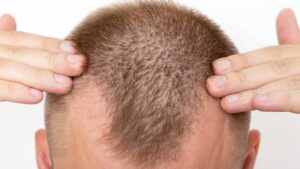Do you often find yourself compulsively pulling out your hair? If so, you may be suffering from trichotillomania. This disorder is characterized by an uncontrollable urge to pull out one’s hair. Trichotillomania can be very embarrassing and frustrating, but it is important to remember that you are not alone. In this blog post, we will discuss the causes of trichotillomania and OCD, as well as some of the best ways to overcome these disorders.
Contents
What Is Trichotillomania Mean?
Trichotillomania is an irresistible urge to pull out your hair. The condition can lead to baldness and damaged self-esteem. Compulsive hair-pulling may be a way of dealing with stress or anxiety. It’s also associated with other mental health conditions, such as OCD, depression, and anxiety disorders.
What Are The Causes Of Trichotillomania OCD?

There are several causes of trichotillomania, and some of these are:
Stress
When you’re under a lot of stress, your body produces higher levels of the hormone cortisol. Cortisol is known as the “stress hormone” because it’s responsible for managing your body’s response to stress. One of the ways cortisol does this is by increasing your level of alertness and energy. This can make you more likely to engage in compulsive behaviors like hair-pulling.
Genetics
Trichotillomania often runs in families, which suggests that there may be a genetic component to the disorder. If you have a family member with trichotillomania, you may be more likely to develop the condition yourself.
Brain Chemistry
Certain chemicals in the brain, such as serotonin and dopamine, are thought to play a role in trichotillomania. Imbalances in these chemicals have been linked to other compulsions and obsessive-compulsive behaviors.
Environmental Factors
Some people develop trichotillomania after experiencing a traumatic event or witnessing someone else engage in hair-pulling behavior. This suggests that environmental factors may also play a role in the development of the disorder.
If you’re struggling with trichotillomania, it’s important to remember that you’re not alone. The condition is relatively common, affecting up to four percent of the population. There are many resources available to help you overcome compulsive hair-pulling and obsessive thoughts. With the right treatment, you can live a happy and healthy life.
What Are The Symptoms Of Trichotillomania OCD?

There can be various symptoms of trichotillomania, but there are some of them:
Hair loss
This is the most visible symptom of trichotillomania. The person suffering from this disorder will pull out their hair from the roots, which can lead to bald patches on the scalp, eyebrows, or eyelashes.
Visible Damage To The Hair
Trichotillomania can cause breakage of the hair shafts, which can lead to split ends and frayed hair.
Excessive Grooming
Some people with trichotillomania may also excessively groom themselves, leading to inflammation and infection of the skin.
Obsessive Thoughts
People with trichotillomania may have obsessive thoughts about their appearance or about pulling out their hair. These thoughts can be very distressing and can interfere with daily life.
Compulsive Behaviors
People with trichotillomania may feel the need to pull out their hair in certain situations or when they are under stress. They may also have other compulsive behaviors, such as skin picking or nail-biting.
If you or someone you know is exhibiting these symptoms, it is important to seek professional help. Trichotillomania can be a very debilitating disorder, but there are treatment options available that can help.
What Complications Are Caused Due To Trichotillomania?

Trichotillomania can cause physical complications such as:
Bald Patches: constant hair pulling can lead to bald patches on the scalp, eyebrows, or eyelashes.
Skin Damage: people with trichotillomania may damage their skin by picking at it. This can lead to infections or scarring.
Emotional Complications: Trichotillomania can harm a person’s quality of life. It can cause feelings of shame, embarrassment, and low self-esteem.
Sleep Problems: OCD can cause insomnia or sleep problems because of the constant intrusive thoughts and anxiety.
Weight Loss or Gain: People with OCD may lose weight due to the obsessions and compulsions around food and eating. They may also gain weight if they engage in compulsive overeating.
Emotional Complications: OCD can cause a great deal of emotional distress. It can interfere with work, school, and personal relationships. People with OCD may avoid social situations or certain places because of their fear of triggering their obsessions.
If you or someone you know is struggling with Trichotillomania or OCD, there are treatment options available. Cognitive-behavioral therapy (CBT) is an effective treatment for both disorders.
How to Overcome Trichotillomania OCD?
The first step is to seek professional help. A therapist can help you understand the condition and find ways to cope. They may also recommend medication to manage anxiety or depression. You can also try some self-help strategies, such as:
Identifying Your Triggers
Pay attention to what makes you want to pull your hair. It could be certain situations, emotions, or even boredom. Once you know your triggers, you can work on avoiding them or finding other ways to cope.
Replacing The Behavior
Whenever you feel the urge to pull your hair, try doing something else instead. This could be squeezing a stress ball, taking deep breaths, or chewing gum.
Building Self-Esteem
One of the reasons people pull their hair is because they don’t feel good about themselves. Work on building your self-esteem by accepting compliments and striving for excellence in all that you do.
However, if you have trichotillomania OCD, know that you’re not alone. There are many people out there who understand what you’re going through. Seek help from a professional and try some self-help strategies to overcome your condition.
Conclusion
In conclusion, trichotillomania and OCD are two different conditions that can be difficult to live with. However, there are treatments available that can help you overcome these challenges. If you or someone you know is struggling with either condition, don’t hesitate to reach out for help. With the right support, it is possible to lead a happy and fulfilling life.
If you are looking for affordable Online OCD Counseling MantraCare can help: Book a trial OCD therapy session


